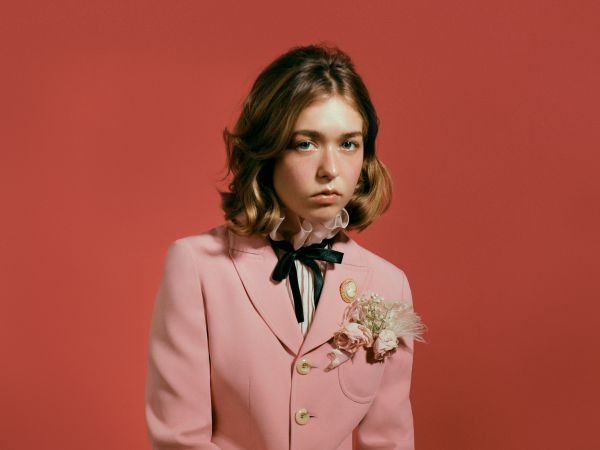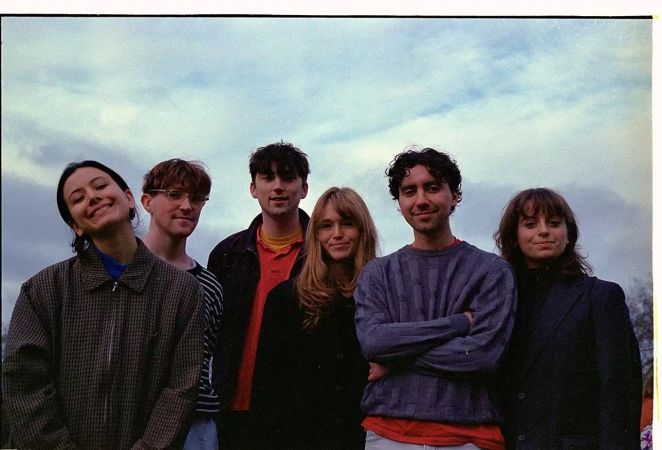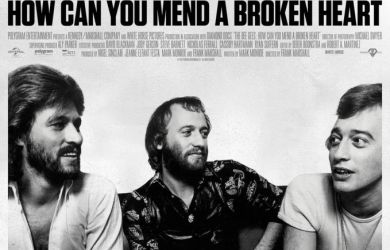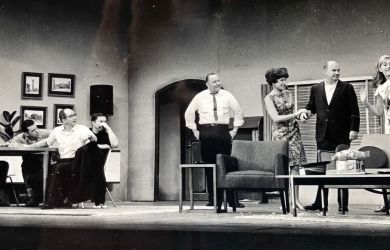
August 12, 2022
Fuji Rock 2022 Wrap Up
Interviews with Snail Mail, Hiatus Kaiyote and Black Country New Road
Fuji Rock 2022, the 25th edition of the festival, saw a return to almost full-scale festivities with nine stages of music and over 150 performances taking place over the three-day event. With attendees enjoying near-perfect weather all weekend long, a rarity for the festival, as well as the return of international artists for the first time since 2019, spirits were high and there was an overwhelming sense that everyone was excited to be back. Highlights of the weekend included an early-morning appearance from Mongolia’s The Hu, Awich’s Fuji Rock debut and Jack White’s Saturday night headliner as well as unforgettable sets from Snail Mail, Hiatus Kaiyote and Black Country, New Road who we were lucky enough to chat with over the weekend.
Snail Mail, the indie-rock project of Baltimore’s Lindsey Jordan, performed late afternoon on Saturday. One of the buzz-acts of the festival, the White Stage was completely packed for the band’s set which featured a tight performance of tracks from both 2018’s Lush and the new album Valentine. Jordan’s powerful and dynamic vocals were the standout of the set which was the first opportunity for Japanese audiences to see many of the tracks in a live context.
Friday night marked the second Fuji Rock performance for Australian neo-soul band Hiatus Kaiyote who, having previously performed at the White Stage in 2019, seemed right at home at the Green Stage this year. The first show of a three-month tour in support of the band’s new album, enthusiasm was high throughout their set which survived the technical issues that plagued Vampire Weekend on the same stage shortly after.
Black Country, New Road was a highlight for many of the White Stage’s Sunday afternoon crowd. With the departure of the band’s lead vocalist in January of this year, the set was made up of entirely new material resulting in a polished yet raw and emotive set which ended in tears from bassist Tyler Hyde. Having experienced numerous stops and starts in their short career, Fuji Rock 2022 marked the first trip to Japan from the young six-piece band but with any luck we’ll be seeing much more of them in the years to come. A special mention to the the best soundcheck of the weekend with all members giving their best Jack White impersonation.
Snail Mail
Saturday July 30, Lindsey Jordan

Metropolis: This is your first time playing in Japan since 2018, right? Have you ever visited here outside of touring?
Lindsey Jordan: No, I wish. I’m trying to plan on vacation but I just don’t ever have any free time. It’s like, in the works, I’m really trying to come back. I really want to be here for like a month.
M: How does it feel to be back in Japan, are you enjoying Fuji Rock?
LJ: Yeah, it’s been sick. I love all the nature, the crowd was awesome and, yeah, I’m having a really nice time.
M: You’ve just come off a European tour and are about to go into a run of North American dates, how does it feel to be touring again?
LJ: It’s been really good, all the shows have been amazing. The European tour was really fun. It’s different, I’m so much older now that I like look at it differently and I take it seriously in different ways than I used to. There were ways that I feel like I was a teenager about it, you know? And now, I’m just very serious about the show. I’ve got a long warm-up routine and we practice a lot it’s just a lot, it’s different.
M: What was the process like getting the new tracks ready to play live?
LJ: We’ve practiced for months. We have to re-practice all the time and we didn’t get a chance to practice for this between the European tour and this. But damn, we were doing like runs of 10 days straight practicing all day long and we did that three times.
M: Your voice sounded huge at the set today.
LJ: Thank you. Yeah dude, physical therapy. Just a lot of work and maintenance. It never used to take me that far and ever since I’ve been a singer I’ve had polyps.
M: Really?
LJ: Yeah. Since I was like 15. So I’ve never not had a smoker’s voice and I’m not even a smoker. It’s really nice to just be able to have a full range and all the songs are higher now which is cool.
M: You were a lot more involved with the production process on this album, what was that experience like and is it something you think you’ll continue to remain involved with?
LJ: 100%. When I was a teenager I was in school and I was so busy and overwhelmed and everything was scary and taking on any extra responsibility was not possible I was like I don’t want to learn how to do this, I can’t. And then eventually it just became a matter of like wanting to make those decisions and knowing that I have an ear for it and wanting to learn about it enough that somebody couldn’t take control of my project. The more of it that’s me, the more proud of it I feel, the more I feel like it’s mine. The record is more personal and I wanted it to just be me.
M: The new album is deeply personal, is it cathartic having it out in the world? Do you get anxious about releasing a new album?
LJ: Yeah, I definitely was anxious about releasing it. It’s very personal and it’s really detailed, nothing’s made up. You don’t want to be the person, stirring it up in your social life, you know? It’s just I want to be honest and I want to experience catharsis from writing about these things that I need to work through but it is an uncomfortable thing to implicate others.
M: Is it catharsis because you want it to be that way or is it just what happens naturally when you start writing?
LJ: It’s natural, I mean with those songs, particularly, I was really going through it and the making of those songs was a really big part of my healing process. And I was just taking back my sense of self by making a record. I was like I haven’t written in so long, I need to just do this for me. And so it really was like getting my thoughts out and putting them into lyrics and melody and all that stuff and so many tears were shed, you know? It was really, really serious.
M: I read that making the new album was a different experience for you in that you were writing and producing the whole thing from scratch as opposed to assembling existing tracks. Were there any other lessons you took from Lush into Valentine?
LJ: The big thing for me was knowing when to stop myself because it’s really easy to overdo it, like just keep on adding and adding and adding but that doesn’t necessarily make anything good. Or if you keep going back and editing, you’re not always making it better the more that you do surgery on stuff. For me, it was a big matter of just trusting my instincts and I think once you involve too many other people, being like, Do you like this? Do you think these synths should be here? Everything gets cloudy so I just made it. I was tunnel vision, I thought I just gotta trust myself. Yeah, I didn’t trust myself yet on Lush.
M: Some reviews of Valentine have said that it sounds like a more mature album than Lush, do you think that’s an accurate assessment of where you were intellectually and emotionally in 2020 as opposed to 2017?
LJ: Definitely. It’s hard to even have a real sense of self in high school. I think I had a self but it’s not the person that I am now at all. I feel like I mostly gained self-awareness in my 20s. And that is crazy. Even from now to when I made Valentine, I can’t imagine writing the same way. Naturally being a fan of literature and a reader, I want to see my writing improve and I want to see it change and evolve with what I’m consuming and where I’m at in my life. It’s a conscious thing, I’m trying to make the prose better, I’m trying to make it more mature. It’s natural and it’s unnatural.
M: You were a three-piece when the project started, what’s it like now as a five-piece?
LJ: It’s complicated. Because the three-piece is the originals, we’re all friends from when we were in high school and stuff. Alex, the bassist, and I went to high school together, I met Ray from going to shows when I was in high school. But It’s fun to be able to expand the sound, it’s always about experimenting and working on it and trying again when it doesn’t sound full enough and the hardest thing about it is just being tight with five people, that’s really hard.
M: Have you started working on new stuff yet?
LJ: Yeah. I mean, sort of. I definitely have bits and pieces that I know I’m gonna work from. But I haven’t really felt super motivated to work on stuff on the road, that’s always been a hard thing for me.
M: You wrote both albums at your parents’ place, right?
LJ: Yeah.
M: Do you think you’ll go back?
LJ: Maybe. I do love being there. It’s awesome. They have really cute dogs.
M: What kind of dogs?
LJ: They’re like these little long hair Chihuahuas, so cute. Three cats. Yeah, and it’s dope. It’s just nice to be in the suburbs. And also it kind of feels a little bit magical. Like I keep on writing my best stuff in that room. So I’m starting to think I’m starting to trick myself, you know? Like it’s jinxed.
M: Thank you so much for your time and all the best with the rest of your shows.
LJ: Thank you.
Hiatus Kaiyote
Saturday July 30, Paul Bender, Simon Marvin, Perrin Moss

Metropolis: Amazing set yesterday, how was it for you?
Paul Bender: It was great.
Simon Mavin: Really nice.
Perrin Moss: It’s the first show of a three-month tour so we’ve got a bunch of new gadgets and stuff going on, new in-ear monitors. But it’s just beautiful to be playing with the band again.
M: Last time you played here was Fuji Rock 2019, right? How does it feel to be back at Fuji Rock?
PB: Awesome, we love it here.
SM: It’s probably our favorite place. We’ve played in Japan about five times I think.
M: How did the relationship with Japan come about?
SM: The first thing was through Blue Note, the club. We were just playing there pretty much exclusively. That was the main connection we made and then we were coming back every year to play there. And then we did the festival and then it just moved out from there.
M: Last time you were here I think Nai Palm had a pokemon on her boots and kewpie on her hat, not to mention the track Laputa from your second album is a Ghibli reference. Is Japanese anime and culture an interest shared by the whole band?
SM: Yeah, I love anime.
PB: I love some anime. I love the classic old stuff, like “Ghost in the Shell” and Ghibli films. Japan has its own interesting stuff going on in heaps of directions, like both really super cute stuff and super weird.
M: Your music often features odd time signatures and progressive elements, do you consciously go into writing music that way, or does it naturally stem from the melody or the groove?
PB: I think a bit of both. Initially, I just wanted to learn how to do a bunch of different things like that. And the more I’ve gotten used to it, the more I come up with stuff that just happens to be in an odd time signature. Sometimes you’re just trying to find something that feels interesting and it’s only later that you might analyze it be like Oh, that’s why it’s interesting.
PM: For me, coming from a production background but not really knowing how to produce, I used to chop up samples a bit oddly and try to find the common time in it and then I tried to play drums from that. And then, with these guys, solidifying what the odd times are and then kind of trying to repeat it. That’s been like a challenge for me back in the day but as Bender said, the more you do it, it becomes really normal after a while.
M: I read elsewhere that Nai said in a previous interview that her 2018 breast cancer diagnosis changed her perspective on life. This is a theme explored lyrically in the new album but do you think this shift in perspective also bled into the composition of the album overall?
PB: I think to agree. I think a lot of it was just time passing and people going through different life changes and experiences. And without really forcing it in that direction, I think it became just naturally more of an emotive album than the previous ones. I think where everyone was in their lives, it just sort of led to a different feeling on it and there’s like a bit more gravity. And, you know, we hadn’t made a record in ages and we hadn’t toured for ages, we hadn’t finished something together for a long time so it just felt like it naturally found its way to something full of that kind of resonance.
M: The first album received a grammy nomination and the second album was voted one of the best albums of the year, the new album has been met with universal acclaim and multiple award nominations. How much or how little are expectations and previous success on your mind when you start work on a new album?
SM: I think it’s different for everybody. But for me, zero. I don’t really think about it at all and none of that stuff really affects me in that way. With this band any contribution that I give is always just about the music, you know? The whole concept of a band is collaboration and that’s the essence, I think. If you can bring something to it and then there’s a collaboration and someone does something to it then that changes the way that you interpret the thing that you’ve brought in and it becomes something completely different to what you imagined from the beginning. That’s the shit that A.I. probably will find difficult to figure out, you know? That’s the magic, that’s the essence of collaboration.
PB: It’s not that we never think about the audience, but the way I think about it is, you don’t change something because you think the audience won’t get it. It’s more that the audience deserves for you to go as hard as possible towards that thing you’re trying to do. So it might be weird or it might be confusing or whatever, but as long as you’re committed to executing it with integrity, it feels like that’s the way that I would think about the audience, they deserve for you to do a good job.
PM: Yeah. It’s interesting because it’s art but it’s also entertainment too. So I never really think about the entertainment part as much as the art. We’ve always said amongst ourselves that getting all four of us on the same page is enough of a challenge and if we can all be happy with it, then we’ve done the right thing, and then if the audiences like it, then they do. But I feel that we’re proven to ourselves enough now through the three albums that audiences are with us.
M: Melbourne is such a melting pot for a variety of different music scenes. How much do you think the culture of Melbourne influenced the band’s sound?
PB: I don’t think it really plays into it. None of us is very interested in what the current fad is.
SM: I think it’s kind of changed, man. Not the scene but our involvement in it. Because 15 years ago, I was definitely in the scene. I was playing in a lot of different bands and really feeling the Melbourne scene. Whereas now, I’m old. I don’t do that anymore, you know? I stay home and it’s a different energy for me now where I can focus on what I want to do without any outside influences or only ones that I choose.
But that doesn’t mean that the scene isn’t a positive thing. It’s like an epicenter for Australian artists to meet and create. So if you’re interested, you go to Melbourne and as an artist, you can really hone into what you want to do there. Hiatus had a residency at the Evelyn for six months, we played there every week and that’s where we got our sound together and after a couple of months it was packed out and it was selling out that venue. And that’s what so many bands have done, it’s a really good way to get your band tight and get a following.
PB: Yeah definitely. Out of from traveling to so many different cities in the world you realize that it’s a pretty rare thing.
M: Speaking of touring, this is the first show of the tour, right? Where are you heading next?
PB: We’re going to the states. Flying into San Fran, playing Outside Lands Festival, going to Philly and then getting in a bus for a whole bunch of stuff all over the country and then after that we’ll be going to Europe and the UK and basically wrap up near the end of October. So it’s gonna be our biggest tour really, we’ve got everyone, all the backing vocalists, a really solid crew now, a well-oiled machine.
M: Thanks for your time today. Any plans for while you’re in Tokyo before you continue the tour?
PB: I definitely like Tokyo for looking for records, looking for clothes, eating the best food ever and drinking good whisky. We love coming to Japan, It’s so good. It’s such a fun place to travel. Not everywhere is a super fun place to travel.
Black Country, New Road
Sunday July 31, Tyler Hyde, Lewis Evans, May Kershaw, Charlie Wayne, Luke Mark

Metropolis: So you got a chance to walk around a little bit yesterday. You saw Jack White’s set, was there anyone else that you enjoyed?
Tyler Hyde: Dinosaur Junior.
Lewis Evans: That was cool.
Charlie Wayne: That was wicked. Those guys rock out.
Tyler Hyde: They’ve all aged so gracefully in different directions. They’re an awesome triad of how to age gracefully.
Charlie Wayne: It was a real win for the guitar solo yesterday, across the board.
Luke Mark: The show is going to be real different today guys.
M: Is this the first time to Japan for everybody?
CW: Tyler has actually been to Fuji Rock a couple of times.
TH: Yeah, this is the best festival in the world. It’s just so beautiful. It doesn’t even matter if you don’t get to see anything.
M: So you’re kind of in the middle of a European tour at the moment, right?
CW: Kind of. It’s just been like festivals, flying out to random places.
M: Previous European and American tours have been canceled. How does it feel to be getting out to play shows?
LM: Umm, good. Difficult. Because we keep starting tours and then they get canceled or they cancel just before we go. It’s been pretty intense because we’re not really used to it yet. For a band who has done two albums we basically haven’t toured. We’re kind of like, ill-equipped.
M: And you’re not playing any of the material from the first two albums, right? How much have the new tracks changed since you started playing them live?
CW: Some of the songs Tyler had been working on by herself and they’ve been sort of adapted for the band. And then some of the other songs were written for the band around basically January up until May. And it’s kind of annoying because we like tweaking songs a lot, especially when they’re so recently written. And when you’re performing them a lot, that’s when you know what to change and how to change it. Having the time off is really important to apply those changes and workshop them. But from May we haven’t really had any time off so we do want to change the songs and mix them up a bit, but we haven’t really had the opportunity.
M: You’re about to tour North America with Black Midi. Will you have much downtime before then?
TH: No, we’ve got six days in England between now and October. So I think we have to change the way that we adapt performances, it’s going to have to happen more on the road. Because we get so bored, let alone when we know that the music has to be adapted for performances.
M: Speaking of Black Midi both BC,NR and Black Midi are generally mentioned together when talking about contemporary English bands, did you know them before BC,NR when you were playing as Nervous Conditions?
TH: Yeah we were playing on the same bill as them at The Windmill and we were mind blown from that second. And it was nice to see them keep going on because we’ve kind of grown up together in that scene and it’s nice to do it with your buddies.
M: There’s a handful of new English bands that share similar post-rock, post-punk and experimental influences, how much do you think the surrounding environment affects the way that bands develop?
CW: Our experience has mainly been around The Windmill and places like that and Black Midi are really the ones that we know the best. I think that definitely, venues like that are entirely conducive to creating a lot of interesting stuff. Because you’re surrounded by other people and you get to see other bands. Tim, the guy that runs it and curates a lot of the nights, he’s fantastic because he puts on a huge amount of stuff and he takes a risk. He’s always putting on interesting, brand-new stuff and that’s what feeds the environment
LM: Also, because of Tim’s attitude, if you go to the windmill and you see a really cool band like Black Midi, you’ll be like if I really wanted to I could play a gig here, you know? So if you start a band you know there’s somewhere to go.
TH: But it’s rare having these kinds of venues where the person that runs it is easy to talk to and encouraging and offering.
M: I want to talk about the first two albums a little bit. They were released within 12 months of each other, right?
LM: 364 days, yeah.
M: So the stuff on the second album, were you already writing that before the first one was released?
CW: Yeah. Like “Basketball Shoes,” the final track of the second album, we had the end section of that from 2018, before we’d even played five shows.
TH: Yeah, it was nearly put on the first album. But it informed so much, if not all of the second album, that we didn’t put it on the first. It would be giving away too much.
M: Do you think any of what you’re playing live now will be released? Tyler said elsewhere that your next release would be something like a film score.
TH: That’s just the dream.
CW: Yeah. If someone let us know we would totally do that. We did have an offer to do something like that but yeah, we decided not to do it though because we had to write six 90-minute scores for October and we have six days until October.
LM: If anyone wants us to do one, we need to know far in advance. That’s important. Keep that in the interview.
All: Laughs
CW: But in terms of this stuff, this summer, the way I’ve been thinking about it is, when you go to a festival and you go and see a band or you go and see any act, you kind of expect them to do a relatively prescriptive set of music, stuff which people know, regardless of its context.
I think what we’re doing or at least what we’ve tried to do is flip that whole format on its head and create something which may or may not exist outside of the summer. Like it’s just a show in and of itself that has a lot of interesting musical moments and it’s about watching the band rather than seeing the music. I think that’s a fun idea and it makes the whole idea of playing this summer and doing these festivals kind of interesting because these songs may never exist in any other context without going to see it for what it is now and after this summer we’ll move on from it.
M: You’re doing a lot of festival shows between now and the end of the year. Have you developed any festival dos and don’ts that you’d like to share with our readers?
LM: Don’t Pocari Sweat jelly, do Pocari Sweat liquid.
LE: I say do Pocari Sweat jelly, just not room temperature. Stay hydrated.
CW: look after your friends.
LE: Conquer your enemies.
LM: Wear sunglasses.
TH: This might sound bad because there are six of us and we travel with two managers but, don’t travel in a group of eight. Because when you don’t have phones, being in a group of eight is so difficult, you don’t end up doing anything. Four max.
CW: Don’t sweat the small stuff.
LE: Don’t ever sit down. Always be moving.
CW: Always go north. Constantly go north.
LM: Never stay at any one show for more than two minutes. Something better might be happening.
CW: Never give anyone the benefit of the doubt, ever.
M: Thanks for speaking with me today. Do you have much time in Tokyo after Fuji Rock? Anything planned?
TH: Two nights.
CW: Tyler’s Birthday.
TH: We’ve never been to Karaoke or a club in Tokyo.
LM: We’re just going to have it large.







